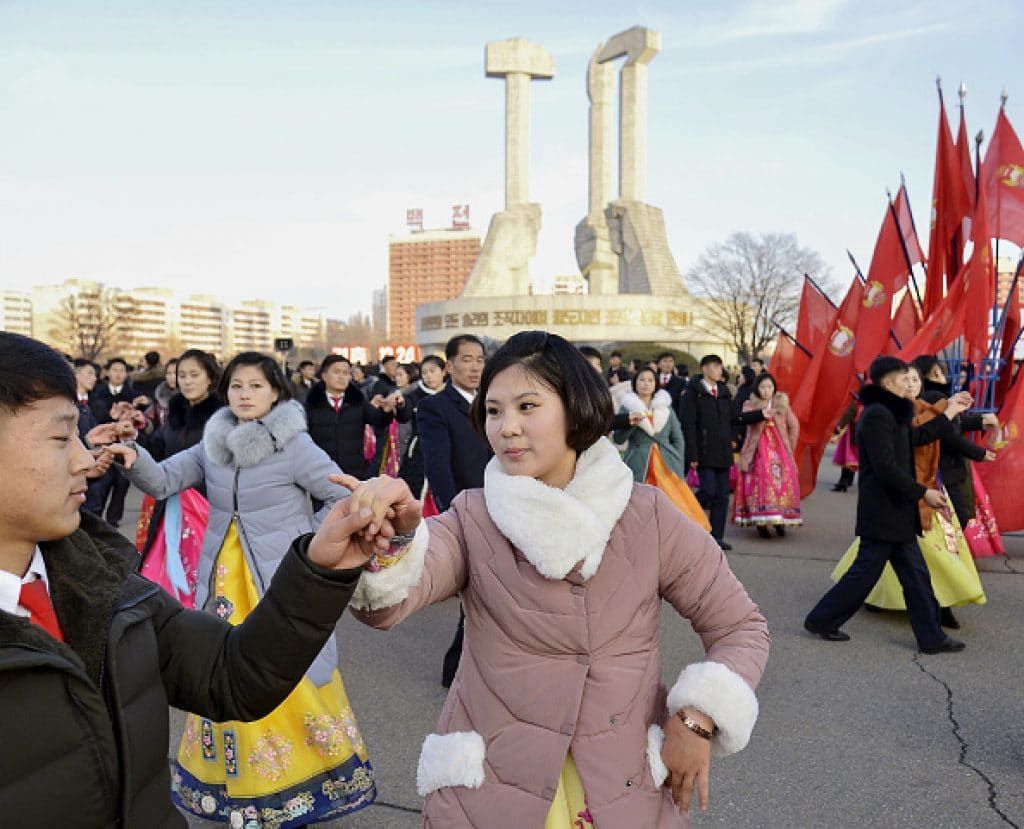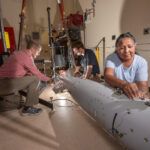No Christmas gift from North Korea? Not so fast.
By Duyeon Kim | December 27, 2019
 People dance in Pyongyang on Dec. 24, 2019, the birthday of North Korean leader Kim Jong Un's late grandmother, Kim Jong Suk. (Photo by Kyodo News via Getty Images)
People dance in Pyongyang on Dec. 24, 2019, the birthday of North Korean leader Kim Jong Un's late grandmother, Kim Jong Suk. (Photo by Kyodo News via Getty Images)
Christmas came and went without Santa Kim coming to town. North Korea’s warning that the United States would receive an unwelcome “Christmas gift” was never guaranteed. Actually, it came with a condition attached: Pyongyang said “it is entirely up to the US what Christmas gift it will select to get.” Did President Donald Trump send North Korean leader Kim Jong Un a secret letter, or vice versa? If so, it won’t take long to find out. Did Beijing privately warn Pyongyang against doing anything provocative on Christmas? Did Trump’s envoy Steve Biegun deliver a message to Pyongyang through a third party when he traveled in the region last week? Did Pyongyang restrain itself because China hosted the leaders of South Korea and Japan on Christmas eve? Was Pyongyang bluffing?
Or is North Korea in fact focused instead on whether Washington will meet its year-end deadline to propose a satisfactory deal before deciding whether and how to respond?
These questions may go unanswered. But Kim, nevertheless, probably did not get cold feet. North Korea’s course of action after the year-end deadline will be far more significant than a gift timed to coincide with what it sees as an American holiday. After all, anything can happen in the remaining six days of 2019 after Christmas. And presents can be delivered any time the giver feels so compelled.
North Korea has been sending some clues as to what it might do to show its displeasure if its deadline passes without the right American response. For the past several weeks, Pyongyang has been telegraphing that it might resume intercontinental ballistic missile (ICBM) launches: It tested engines that could power ICBMs or satellite launch vehicles, touting that the regime has bolstered its “strategic nuclear deterrent,” which is code for a nuclear-tipped ICBM.
But Pyongyang can select from a range of weapons to test in 2020. It’s anybody’s guess what will be inside Kim’s future gift package, and when it might be delivered.
A mixed bag of gifts. If it decides to continue testing weapons, North Korea can choose from two general categories in the new year. It can continue with the same level of dangerous actions as this year, testing short-range ballistic missiles and missile engines and perhaps even launching a satellite into orbit or firing a missile over Japan. Or it can take actions that will be widely seen as more provocative: testing ICBMs or detonating a nuclear-tipped missile over the Pacific Ocean in an atmospheric test, which the North hinted it might conduct in 2017. Pyongyang could, of course, decide to conduct all of the above tests over the course of the new year. If past procedures continue to be followed, any missile the North does test will likely include a qualitatively new component, feature, or function.
But North Korea does not necessarily need to conduct visible tests for political purposes. Out of public view, it will almost surely “mass-produce nuclear warheads and ballistic missiles,” as ordered by Kim Jong Un in his 2018 New Year’s Day address. While it certainly could, Pyongyang also does not need to start off the new year with a big bang; it can gradually escalate tensions.
North Korea’s choice will depend on its perception of Washington’s intentions and objectives before 2019 is out. Its calculations will be based on a risk assessment—both geopolitical and military—of how Washington might then respond to its actions. Pyongyang had warned that it could seek a “new path” if Washington did not present an acceptable deal to implement the 2018 Singapore summit statement. Escalating tensions in the second half of 2019 and Kim’s repeated warnings and threats will later justify any actions Pyongyang might take in 2020 that are more provocative: Kim can blame Washington for a breakdown in diplomatic talks that forced it to take stronger actions.
Emboldened and taking a “new path.” Kim will likely decide on his “new path” at an extraordinary meeting of his Workers Party this month and unveil details in his New Year’s Day address. Washington’s response will depend on Pyongyang’s choice of action. But the United States, Europe, and Japan appear prepared to further strengthen “maximum pressure” sanctions if the North chooses the more provocative path of testing ICBMs or nuclear devices. Chinese, Russian, and European interlocutors should quietly warn North Korea against taking such steps, even if diplomacy breaks down. They should also urge Pyongyang to refrain from a satellite launch, even though Trump has not included these in his “red line” of prohibited testing (yet), because the international community will view it as an ICBM test in disguise. Even better for reducing tensions in the region would be for Pyongyang to refrain launching more short-range missiles that threaten Japan, South Korea, and American troops and expatriates and other foreign nationals living in those two countries. But backing off from short-range tests would be an extremely hard sell, because of the Kim regime’s announced national priority of possessing a reliable nuclear deterrent.
Since the February Hanoi summit, Pyongyang has been demanding Washington change its age-old negotiating approach by using a “new calculation.” Since the first nuclear crisis of the 1990s, the basic give-and-take formula applied to negotiations and resulting agreements was denuclearization first, then benefits: North Korea would first take, or agree to, some significant, verifiable steps toward denuclearization, and would then receive corresponding benefits.
Pyongyang is now demanding big concessions before it considers taking significant, verifiable denuclearization measures. In particular, it wants Washington to agree to lift key UN sanctions and end joint military drills with South Korea in the first stage of a deal. Unlike his father and grandfather, Kim likely believes he now has sufficient leverage in negotiations to make such demands, armed with confidence in the technological achievements of his nuclear weapons and delivery systems.
Pyongyang’s “new path,” however, will not necessarily be focused solely on Washington. North Korea has a bigger national agenda that does not heed to events in its external environment. The regime’s foremost goal is achieving economic and military might through self-reliant means—encapsulated by its state ideology, juche. And the North under Kim Jong Un’s leadership aims to be perceived as a normal state, enjoying international prestige and developing relations with “socialist countries and… countries that are friendly to” Pyongyang. Kim might also believe that time is on his side in the long game of becoming a nuclear and economic power over what he assumes will be the next several decades of his rule. So Kim might take relatively measured steps in order not to provoke Trump, perhaps thinking that may help his reelection, if he believes Trump is the only American president who is willing to conclude a significant agreement with Kim. But the North Korean leader may instead conclude he can survive without striking a deal with any American leader. In that case, there is no way for anyone outside the Kim regime to know the shape and size that provocations might take.
What gift may come. Unilateral gift-giving and hospitality are an integral part of Korean culture. Gifts are given at any occasion, imaginable and unexpected — major holidays like New Year’s and Chuseok (Korean Thanksgiving), commemorative days, in business meetings with foreigners, after receiving a first paycheck, at weddings and funerals, at birth, and just because. The word “gift” (seonmul) is spoken of quite often in the Korean language. In the world of foreign affairs, South Korean pundits and officials often wonder what “gift” will be presented by one or all parties involved in major government negotiations or a summit to break a deadlock or advance relations.
For decades, North Korea has given all sorts of gifts, depending on whether it felt Washington and Seoul were naughty or nice—or to extract concessions from its adversaries. These gifts ranged from cooperating diplomatically, to taking the first baby steps towards denuclearization, to lodging insults, violating agreements, testing nuclear devices and missiles, hacking servers, blowing up civilian airlines, and shelling a South Korean island.
The road to 2020 remains uncertain. And North Korea does not need a holiday—it will continue to be the gift-giver that keeps on giving. The challenge is creating an environment that elicits a welcome gift from Pyongyang and satisfies the interests of all stakeholders involved.
Together, we make the world safer.
The Bulletin elevates expert voices above the noise. But as an independent nonprofit organization, our operations depend on the support of readers like you. Help us continue to deliver quality journalism that holds leaders accountable. Your support of our work at any level is important. In return, we promise our coverage will be understandable, influential, vigilant, solution-oriented, and fair-minded. Together we can make a difference.
Keywords: Kim Jong-un, North Korea Christmas gift, Santa Kim
Topics: Columnists, Nuclear Risk, Nuclear Weapons
















It’s as easy as 1-2-3. Singapore: President Trump and Chairman Kim Jong Un state the following: 1. The United States and the DPRK commit to establish new US-DPRK relations in accordance with the desire of the peoples of the two countries for peace and prosperity. 2. The United States and DPRK will join their efforts to build a lasting and stable peace regime on the Korean Peninsula. 3. Reaffirming the April 27, 2018 Panmunjom Declaration, the DPRK commits to work toward complete denuclearization of the Korean Peninsula But the US focuses on 3 and neglects 1 and 2. The US… Read more »
President Trump has been delivering “gifts” in the form of lax sanctions enforcement since May 2018. Kim Jong Un, unfortunately, has not reciprocated. Trump at the Ottawa G7, which preceded the historic Singapore summit by a few days, said he was giving Kim a “one-time shot” to disarm. Kim has not taken advantage of the benign period, so it is time to go after China, Russia, and other sanctions-busters with vigor. With less cash, Kim will be less assertive. Denuclearization will then be far more likely. To get a gift we want, we have to stop giving ourselves.